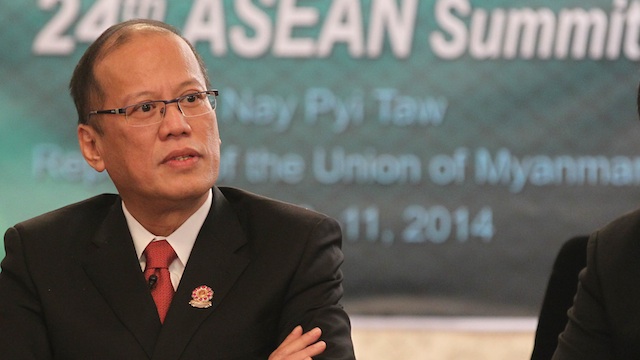SUMMARY
This is AI generated summarization, which may have errors. For context, always refer to the full article.

MANILA, Philippines – President Benigno Aquino III informed his fellow leaders in the Association of Southeast Asian Nations (ASEAN) about the Philippines’ move to file a memorial against China before the tribunal for the law of the sea, but said he did not specifically ask for support for arbitration.
Despite this, Aquino said he is content with the consensus reached by ASEAN leaders and their joint statement to categorically state their concerns about freedom of navigation.
“We did mention that, consistent with everybody’s desire to resolve it in a peaceful manner, we did inform them officially of the March filing of the memorial before the arbitration tribunal under ITLOS (International Tribunal for the Law of the Sea),” he told reporters in Myanmar on Sunday, May 11.
“I don’t think there’s any disagreement that there really is – in this current incident, or series of incidents – a cause for worry and concern by all parties,” he said.
The Philippines and China are embroiled in a maritime dispute in the West Philippine Sea (South China Sea). Other ASEAN countries – like Malaysia, Vietnam, and Brunei – are also claimants of territories in the South China Sea.
Aquino said he also discussed the Philippines’ experience with China with regards to incidents at Ayungin Shoal, Scarborough Shoal, the Kalayaan Island Group, and the construction on Mabini Reef and the Galoc service contract area.
He said the “point was very well taken” as seen in the statement agreed upon by every single member in ASEAN, which he said “is not the easiest thing to do.”
The President also said the reiteration for a full and effective implementation of the Declaration on the Conduct of Parties in the South China Sea (DOC) is proof it has not yet been fully implemented, and will lead to accelerating the process of finalizing the Code of Conduct which he pushed for during the trip.
“So I don’t see anything lacking within this particular statement,” he said.
Observers say the statement marks a change of tone by the regional bloc, many of whose members have close economic and political ties with China.
Surging maritime tensions dominated the meeting of Southeast Asian leaders, just days after both Vietnam and the Philippines locked horns with China in contested waters, stoking international alarm.
Vietnam has accused Chinese ships of ramming Vietnamese vessels in disputed waters, the latest escalation in territorial disputes involving the Asian giant.
Marked change
Aquino refused to say what message he thinks China is sending with its recent aggression, but conceded there have been marked changes in the way the superpower has been dealing with its neighbors.
He said Vietnam shared its failed efforts in trying to reach out to China through various channels, despite an agreement on party-to-party relations that guaranteed there would always be channels by which they could communicate with each other.
“So that in itself the inability to be able to talk directly with their counterparts is another point that I think should be of concern. It seems to mark a change,” Aquino said.
“Well, of course, this whole incident is a change and then the other ancillary acts seems to indicate further changes and one has to wonder exactly to what extent will the changes amount to – how far will they go.”
Aquino admitted he is concerned about similar behavior from China toward the Philippines in disputed areas.
EDCA as consideration
Amid tensions in the South China Sea, the Philippines recently signed a defense pact with longtime ally United States to help the country’s military reach minimum defense capability. The Enhanced Defense Cooperation Agreement (EDCA) gives US troops wider access to Philippine bases and allows joint activities between the two countries’ militaries.
Aquino said it may not deter China from making a similar move in Philippine waters, but “at the very least, it will be a factor that they will have to consider.”
But he admitted unpredictable moves on the part of China makes it “presumptuous” for him to express his thoughts on what he believes China would or would not do, saying he is “hard-pressed to answer on their behalf.”
The President also took the opportunity to defend the EDCA, which critics and lawmakers have questioned for its legality.
Aquino expressed confidence it will stand scrutiny, saying the government worked on fine-tuning it throughout the process to ensure “it adheres completely with the Constitution.”
“So will it stand scrutiny? Yes. Will there be people who will try to derail it? Yes, also. But we are reasonably confident that anybody looking at it objectively will be able to say that we have met all the stipulations in the Constitution,” he said. – Rappler.com
Add a comment
How does this make you feel?
There are no comments yet. Add your comment to start the conversation.